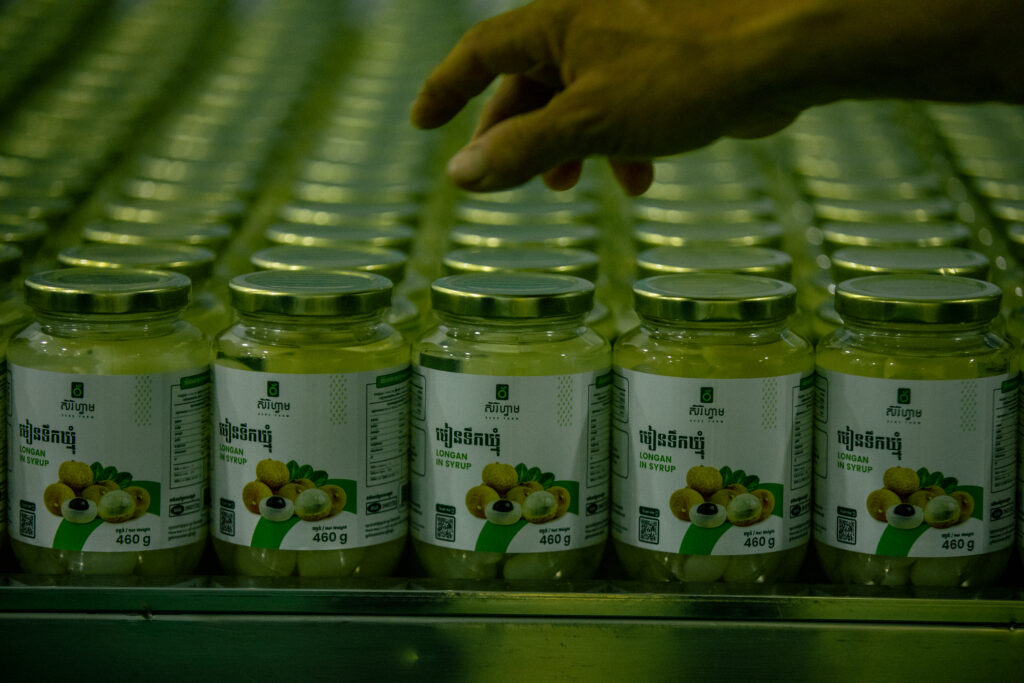One of the many challenges for independent fruit farmers is accessing markets to sell their harvest at just the right time. Local markets are often used, but so are distributors and resale agents who move the fruit into other provinces. But fresh fruit has a fairly short shelf life, and the distribution process often results in spoilage – wasting food and depriving farmers of income.
Such was the case in 2019 in Banteay Meanchey province with an informal group of 25 fruit farmers near the border with Thailand. Determined to find a way to cut their food spoilage losses- and create better growth and higher income – they came together to form the Malai Longan Agricultural Cooperative. The goal was to process their fruit for greater longevity and eventually access new markets. Forming a cooperative, pooling assets, and combining yields would give them greater leverage in the market for fresh fruit – and greater potential to make their vision of becoming processors a reality.
The group, led by Mr. Ourn Chhean, applied to GIZ, the leading German development agency, for assistance. In early 2020, just before COVID closed many international borders, they were able to send five co-op members to Thailand to learn to make juice, dried fruit, syrup, and jam – all in one week.
Then they came home and got to work. It was important to know how to do all of the things they learned during their course in Thailand, but now they had to call on every bit of commitment and determination – as well as their new skills – to make their enterprise successful.

Collecting around US$30,000 from co-op members, the group built a small production facility amid longan and mango orchards. They purchased some small machines and began to test their ability to produce and sell a limited range of products.
“We were all on our own at this point,” said Mr. Ourn, the co-op’s president. “We didn’t have a drying machine then – it was too costly – so we made mango juice and longan syrup at first.”

They sold their new products in local shops and markets and continued to learn more about the business, recruit new co-op members, and set incremental goals for growth.
Their obvious commitment to using the skills they learned in Thailand led to more support from the GIZ Regional Economic Development IV program in procuring a fruit-drying machine and receiving further specialized training. The machine was so large it came in multiple boxes over several weeks in 2021. Co-op members taught themselves how to assemble the new machine and expanded their production space to accommodate it.
Finally, early in 2022, they began to dry mango, coconut, longan, and pineapple batches. They also began to make jam and wine.

The juice and longan syrup, currently the primary products, have qualified for the government certificates needed to sell into larger supermarkets throughout Cambodia. Co-op leadership continues to work to obtain the same important certifications for the rest of their products, starting with longan and mango wines and dried fruit.
“Once the drying operation gets bigger, and we have the certification, we can hire more workers,” said Mr. Ourn. “Right now, we have twelve full-time employees.”
The co-op now has 49 members, up from the original 25, all of whom are independent farmers in the area. They each sell directly to market but hold back some of their harvest for the co-op to collect once or twice a week for use in the production facility near Malai.
They need a lot of fruit to bring their drying operations to scale. For example, one hundred kilos of longan produces about 12 kilos of dried fruit once it is washed, peeled, cut, and dried. And it takes time. The same amount of longans takes 8-10 hours to dry to the right specifications.
In spite of all of its internal work, the co-op is not an insular operation. Its members provide for three local students each year to attend university, and they teach other farmers how to process fruit. They have become such experts in the necessary food production skills GIZ is now sending others to learn from them. The circles of learning continue to multiply and will undoubtedly lead to innovation, growth, and a higher standard of living for the many families within them.
Article by Community Cooperation for Mutual Success – Proudly CAMBODIAN
